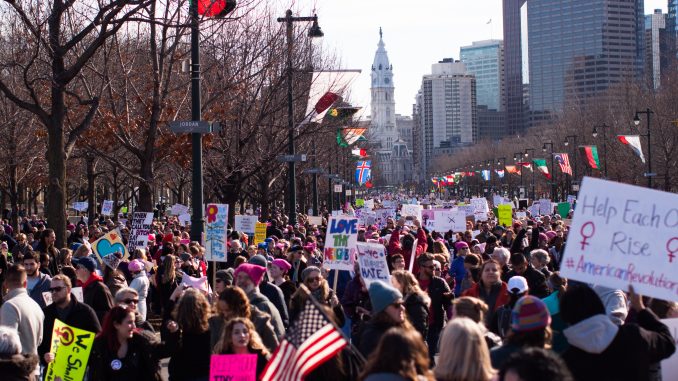
On Saturday, thousands of protesters marched on the Benjamin Franklin Parkway to commemorate the anniversary of last year’s Women’s March on Philadelphia, holding signs with messages of unity, like “Love Thy Neighbor.”
Though individual attendees touted welcoming posters, some city residents and student organizations at Temple decided to boycott because they thought it would not be inclusive or safe for people of color and LGBTQ people. The march originally formed to protest President Donald Trump’s inauguration.
Becky Cave, a junior psychology major and member of Socialist Students of Temple University, said the student organization did not participate in last year’s Women’s March because of its apparent alliance with Hillary Clinton, a candidate the group did not support.
This year, the group decided to skip the march again, a decision that was only reinforced when the city announced in a press release that “all bags are subject to search” at the march.

“The police searching bags hit the nail on the coffin when it came to our decision to boycott the march again,” Cave said. “The Temple student socialists felt the police presence could marginalize people of color or sex workers in attendance. Like last year, the Women’s March has failed to make it clear that the event is not just for white, Democratic women.”
According to the Inquirer, rumors spread through Facebook posts claimed that the Philadelphia Police would be conducting random “stop-and-frisk” searches, and that Philly Women Rally, the nonprofit behind the marches, was allowing it.
At last year’s march, the city did not announce in its press release that police would conduct random searches, and they also did not have entry points into the march along the Benjamin Franklin Parkway.
The rumors of security checkpoints and random searches prompted Temple’s Feminist Majority Leadership Alliance to boycott this year’s march.

Kaila Alderfer, FMLA’s social media chair and a sophomore psychology major, said the police presence is “exactly why” none of the organization’s members attended this year’s march: They feared it would marginalize people of color and discourage certain ethnic groups from attending.
In response to the boycott campaign, Philly.com reported that Deputy Police Commissioner Dennis Wilson announced in a press conference on Jan. 19 that police “are not frisking people” and “are not infringing on anyone’s First Amendment rights in any way.”
Despite this announcement, many still chose to boycott the march due to its lack of inclusivity. Former resident of the United States Virgin Islands Adriana Adelé Akintobi, a yoga teacher at Three Queens Yoga in South Philadelphia, said she attended the protest with the group Swing Left. Swing Left pairs participants who live in highly Democratic areas with the closest Republican swing district to encourage constituents in that district to vote for Democrats. Akintobi works in in Bucks County with the organization.
“More interaction with police, especially for Black and brown folks, can be seen as more of a threat, or causing more fear or issues,” Akintobi said. “I had these same fears, but I just came out anyway, but for those who stayed home for that reason, I think that is totally valid.”
Andrea Sarmiento, a sophomore global studies major, also voiced concern over police presence. Sarmiento is on the executive board of Temple’s chapter of She’s the First, a nonprofit organization sponsoring girls’ education in low-income countries.
“I understand that the police are there just for protection, but at the same time, with all the police brutality going on in our country, I think the police presence is something to be concerned about,” Sarmiento said.
“My parents are from the Philippines,” Sarmiento added. “I am a first-generation American, plus I am a woman, so fighting for equal rights and women’s rights is very important to me.”
Abbey Laine Faber, a 22-year-old North Philadelphia resident and queer Puerto Rican woman, expressed frustration over the lack of inclusivity of this year’s women’s march.

Participants at the Women’s March on Philadelphia hold signs while they walk along the Benjamin Franklin Parkway on Saturday. Some student organizations boycotted the event because of its lack of inclusivity. | COLLEEN CLAGGETT / THE TEMPLE NEWS
Laine Faber was canvassing for Planned Parenthood as part of her job with Philadelphia’s chapter of Grassroots Campaigns, a political consulting firm that specializes in strategic fundraising for charities, political groups and candidates.
“It was so discouraging to see transphobic signs that said things like, ‘No Uterus, No Say,’” Laine Faber said. “There are so many women, both trans and cis, who don’t have uteruses and there are people out there with uteruses that are not women.”
Samantha Hughes, a 2016 health information management alumna, attended the march on Saturday and said she understands the concerns over police presence, but thinks it is necessary for safety.
“[I] see the point of view of the people who are worried about the police presence, but I also see the point of view as in ‘What if?” Hughes said. “With all the crazy things going on in the world, it’d be nice to have maybe some bystanders to be there for that if it were to happen.”


Be the first to comment